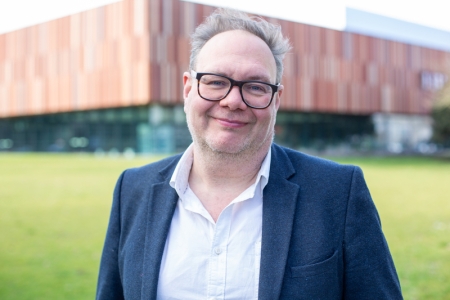There's an evolution of a revolution at the University of Portsmouth, with a new development that is poised to reshape how global plastic research takes place.
The Revolution Plastics Institute has been established in response to the escalating global plastic pollution crisis, and recognises the urgent need for novel, collaborative and transdisciplinary approaches to tackle a challenge that has persistently eluded conventional solutions.
The Institute is a significant new development, evolving from the Revolution Plastics initiative that began in 2020. Since then it has grown into a community of around 100 staff and 20 PhD students.
World-leading experts at the University of Portsmouth believe the global plastic crisis demands more than traditional, monodisciplinary research and isolated technocentric solutions. The Revolution Plastics Institute will adopt an inclusive, solutions-focused strategy, inviting contributions from diverse disciplines and fostering partnerships with the global plastics community.

The Institute is dedicated to fostering inclusive, solutions-focused research that not only understands the complexities of the global plastics crisis but actively contributes to the urgent transition towards a sustainable plastics future. In the face of environmental adversity, our mission is clear: to revolutionise our understanding, collaborate globally and lead the way towards a world free from plastic pollution.
Professor Steve Fletcher, Director of the Revolution Plastics Institute
Professor Steve Fletcher, Director of the Revolution Plastics Institute, said: "We are witnessing an escalating global plastic pollution crisis and the launch of the Revolution Plastics Institute marks a critical moment in our commitment to confront and overcome this pressing challenge. Our approach rooted in multi-disciplinary collaboration and innovative research, signifies a departure from conventional strategies that have, for decades, fallen short.
"The Institute is dedicated to fostering inclusive, solutions-focused research that not only understands the complexities of the global plastics crisis but actively contributes to the urgent transition towards a sustainable plastics future. In the face of environmental adversity, our mission is clear: to revolutionise our understanding, collaborate globally and lead the way towards a world free from plastic pollution."
The Institute builds on the success of the Revolution Plastics initiative, which has been instrumental in informing national and global policies on plastics, pioneering advanced enzyme recycling techniques and contributing to critical discussions on the UN treaty to end plastic pollution. The Institute will operate as a network of interconnected researchers and innovators across the University, consolidating and expanding a world-leading plastic-focused research, innovation and teaching community.
The Institute will be hosted in the University's Faculty of Business and Law. Professor Nigel Williams, Associate Dean (Research and Innovation) in the Faculty of Business and Law at the University of Portsmouth, said: "The Revolution Plastics Institute significantly advances the Faculty's work to address complex societal issues via rigorous, engaged academic research. Professor Fletcher and his team already work with our academics in the areas of Law, Economics, Operations, Marketing and Innovation, and the development of this institute will deepen these partnerships and create new collaborative educational experiences that will enhance our undergraduate and postgraduate student experience.
With three primary focus areas, the Institute aims to:
Evaluate change across the plastics lifecycle:
- Identify and analyse shifting characteristics of the global plastics crisis.
- Gather data on sources, pathways and impacts of plastic pollution.
- Assess environmental, social and human health impacts of plastic pollution.
Socio-economic solutions to reduce plastic pollution:
- Evaluate and develop policy measures to reduce plastic pollution.
- Utilise arts-based methods to engage stakeholders and co-develop solutions.
- Assess the policy, economic, social and cultural enablers for a sustainable plastics economy.
Innovation and technology for a sustainable plastics future:
- Enhance the role of innovation in addressing the global plastics crisis.
- Pioneer enzymatic plastic recycling technologies.
- Develop new technology, materials, business models, and methods to tackle and monitor plastic pollution.
The Revolution Plastics Institute aims to build a sustainable resource base, coordinate research efforts and generate impactful outputs in the fight against plastic pollution.






